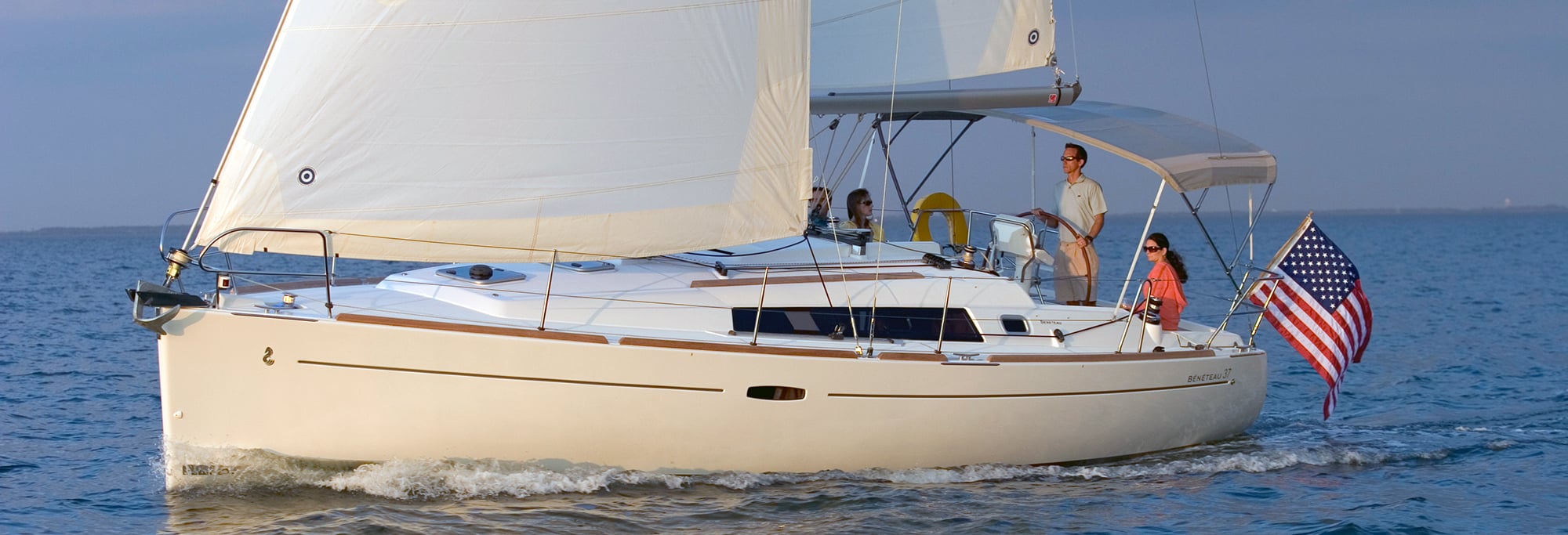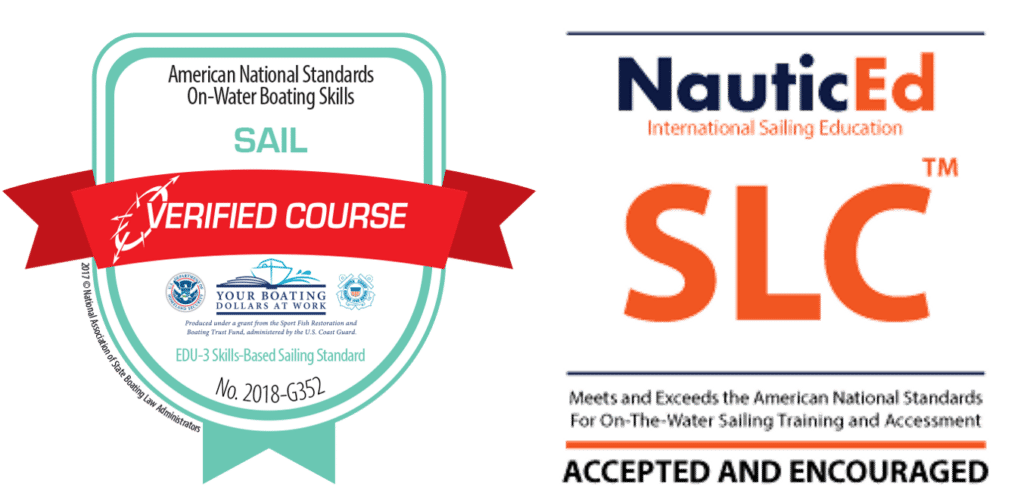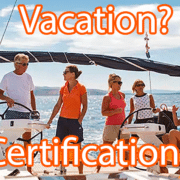How to Get Started in Sailing
Sailing is a captivating adventure that combines the beauty of the sea with the thrill of navigation. However, stepping into the world of sailing requires more than just enthusiasm; it demands a blend of theoretical knowledge, practical skills, and hands-on experience to ensure competence and safety on the water.
NauticEd’s team has worked with over 100,000 students in one capacity or another throughout the years – and based on that experience, below is what we recommend on how to get started in sailing.
— Starting Sailing —
First, there’s really no required path or “right way” to get started in sailing. NauticEd’s team members, as well as our affiliate sailing instructors, all started sailing differently: Some of us grew up sailing, whereas others started later in life. Some started with sailing classes, some sailing with friends on their local waterway or with friends on a captained yacht charter vacation in an exotic destination such as the Caribbean, and others started as racing crew. Some started with a book, some started online, some started with roast beef, and some started with none. And, so on…
Starting with lessons, friends, groups, a captained sailing vacation, or a sailing club can help you gain the necessary experience and ensure that when you do decide to buy a sailboat, you’re making an informed and confident choice. And, getting to know a few experienced sailors around the marina certainly helps since they’re usually forthcoming with opinions and advice.
The NauticEd Philosophy: Knowledge, Skills, and Experience
At NauticEd, we believe that becoming a competent sailor involves a balanced approach of theory + practical skills + experience. This philosophy ensures that every aspiring sailor not only learns the fundamentals but also develops the confidence and competence needed to skipper a boat safely. It’s not enough to just gain a “certification”; true competence comes from a well-rounded education and practical application.
Regardless of “how” you start, you’re going to need the balance of Knowledge, Skills, and Experience to become a successful sailor.
The role of eLearning and online courses when starting sailing
In today’s digital age, eLearning and online sailing courses have proven to be the most effective way to acquire theoretical knowledge. NauticEd’s online courses are designed to provide comprehensive and interactive learning experiences that can be accessed anytime, anywhere. This flexibility allows students to learn at their own pace, ensuring a thorough understanding of sailing principles before they ever step foot on a boat.
Also, it’s affordable. Heck, sign up today for 2 FREE courses with NauticEd. No obligation except we do want you to complete the courses.
Starting with knowledge courses when learning to sail is crucial because it provides a strong foundation that enhances your understanding and safety on the water. Here’s why:
1. Understanding Core Concepts
- Theory Before Practice: Knowledge courses teach essential concepts like navigation, weather patterns, sail trim, and safety procedures. This understanding is vital before you begin hands-on practice, as it allows you to make informed decisions on the water.
- Building Confidence: Knowing the theory behind sailing helps build your confidence, making you more comfortable and prepared when you transition to practical sailing.
2. Safety
- Preparedness: Understanding safety procedures, emergency protocols, and how to respond to different conditions ensures you’re better prepared to handle unexpected situations on the water.
- Risk Reduction: Knowledge courses help you anticipate and avoid potential hazards, reducing the risks associated with sailing.
3. Efficient Learning
- Accelerated Progress: With a solid theoretical background, you can grasp practical skills more quickly because you understand the “why” behind the “how.” This leads to a more efficient and enjoyable learning process.
- Maximized Time on Water: Knowing the basics before stepping on a boat allows you to focus more on developing your sailing skills, rather than spending valuable time learning basic concepts on the go.
4. Versatility
- Adaptability to Different Conditions: Theory courses cover a wide range of scenarios, preparing you to sail in various conditions and environments. This makes you a more versatile and competent sailor.
- Foundation for Advanced Skills: Starting with theory lays the groundwork for more advanced sailing skills and certifications, enabling you to progress further in your sailing journey.
Conclusion: Starting with knowledge courses equips you with the essential understanding and confidence needed for safe, efficient, and enjoyable sailing, setting a solid foundation for your practical experience on the water.
The Importance of Competence over Sailing Certification
Many sailing schools and instructors promote “attendance” certifications that are based on completing a few lessons on the water, reading a book, and an easy test – but at NauticEd, we emphasize competence over certification. Our program is designed to ensure that every student truly understands and can apply what they’ve learned. This approach ensures that when you receive a NauticEd certification, it is a genuine testament to your skills and knowledge.
The emphasis here is that when getting started, please don’t fixate on certifications. Instead, focus on developing your knowledge and experience, and add training as needed (whether a beginner’s class or more advanced training). If you’re attending an on-water sailing course or working with an instructor, focus your time on on-water skills.
If you want to charter boats, also keep track of your experience (ahem, NauticEd offers a free eLogbook). Why? Because charter companies require a resume that is heavily weighed on your experience, not certification. Here, read What is the biggest lie in sailing >
*Note: licensing is different from certification. For example, if sailing in the Mediterranean – you’ll need a license, such as an ICC or a NauticEd SLC. NauticEd staff are expert vacation brokers, so feel welcome to contact us with any questions.
Practical Skills Training with On-the-Water Instructors
While theory lays a strong foundation, practical skills can only be honed on the water (well… near practical with VR can also hone your skills and build necessary muscle memory so we highly advise that). NauticEd has a global network of certified instructors who provide hands-on training in real sailing environments. These instructors are dedicated to helping students apply their theoretical knowledge to actual sailing, ensuring they gain the practical skills necessary to handle a boat confidently.
On-the-water training with qualified sailing instructors is a GREAT way to start sailing! *Note an intangible benefit is that the instructors can usually know all the local sailing groups and sailing opportunities for gaining more experience.
- Ensure that your instructor is qualified (i.e., not just the school, but the instructor). At a minimum, this usually means being USCG Licensed (or appropriately licensed for your country/ sailing area), and preferably the instructor is qualified to teach by the USCG’s American National Standards for recreational sailing. Seriously, you should expect your instructor to be (a) licensed and (b) meet or exceed national or international standards! It’s really not a big ask for professional instructors.
- Avoid “Zero to Hero” programs that promise multiple certifications within a short time. These courses rarely produce good results, especially when you have a mix of sailing backgrounds and experience on the boat – simply, the instructor cannot properly focus on everyone’s needs.
If completely new to sailing, then we do not suggest jumping into a rigorous training program at the start. Instead, look for programs that balance teaching basic sailing skills while having safe fun!
Avoid “Challenging” a Certification
In sailing education, the distinction between “challenging” a certification and undergoing an “assessment” is crucial. A challenge typically presents a pass/fail scenario, placing undue pressure on both the student and the instructor. It focuses on a high-stakes outcome, which can lead to students receiving certifications without addressing critical gaps in their competence. At NauticEd, we believe an assessment is a far better approach, as it focuses on evaluating your overall competence and identifying areas that need improvement. This method, as encouraged by the US Coast Guard under the American National Standards, not only removes the pressure to pass but also ensures that you leave with a clear understanding of your weaknesses, empowering you to develop true competence in the long run. After all, the goal should be to master sailing, not just to pass a test.
Learning with Friends, Non-Profit Groups, Sailing Clubs, or Racing
Sailing with friends (locally or on a charter), joining non-profit sailing groups, joining a sailing club, or crewing are all GREAT ways to start sailing. But also consider the following:
- Learn the knowledge on your own, preferably with an accredited sailing program such as NauticEd. Your experience will be more meaningful and productive when you’re applying knowledge. Sources like YouTube are great, but be cautious in that they’re not held to any standard (i.e., some info is wrong).
- Friend-with-sailboat is one of the best options to get started!! Except, keep a few pointers in mind:
- Offer to help as crew, and learn, while sailing. Take our free courses, or Introduction to Sailing, so that you can be more helpful.
- Be respectful of boat etiquette such as not wearing marking shoes, don’t bring food/drink that stains the gelcoat (e.g., blueberries, red wine, Fanta, etc…), saying “permission to come aboard”, and so on….
- There’s a difference between speaking very loudly and ‘yelling’ on a sailboat. When sailing the wind and sails can make a lot of noise, especially if you’re speaking into the wind – so speaking loudly so that people can hear you is important. However, if your friend is being a jerk about it, then perhaps suggest that they take the Effective Command through Emotional Intelligence Course.
- Never pay anyone for sailing instruction unless the instructor is qualified and, er, is operating legally (in the U.S. that typically means they, at minimum, must have a USCG’s license). Typically (and unfortunately) many groups use a non-profit status to shirk for-profit legal regulations and requirements by using unpaid volunteers. For sure it’s tempting that they’re offering a sailing course for $10 or some other measly sum, but… when using unpaid and unqualified volunteers the quality is often poor, and worse people get hurt (and sometimes die).
*Please note that most non-profit sailing organizations and volunteer instructors are totally legit, many exceeding expectations with safety and qualifications. Instead, we’re just cautioning you to scrutinize such organizations and their legitimacy when they ask for payment (or “remuneration”, the technical term).
- Crewing for racing is a fun way to start. Again, helps if you learn some knowledge first and to be a more productive crew member. And, don’t be shy – don’t hesitate to ask racing groups, yacht clubs, etc… to connect you with skippers who may need crew (especially knowledgeable crew).
- Sailing clubs are also a GREAT way to start. (A) you’ll meet many like-minded sailors, and (B) if the club has a variety of boats, then you get to try out different designs and configurations before either chartering or buying your own boat.
- For additional tips, read Nineteen ways to get sailing experience if you don’t own a boat >
Start by Chartering (renting a sailboat) on a Sailing Vacation
Yes, you can start sailing by renting a sailboat on a week-long sailing vacation. Actually, we think this is one of the best ways to start since you will be immersed in much of the required learnings immediately. Of course, a professional Captain will be onboard at all times to make sure you have a comfortable and safe experience PLUS the captain will be teaching you along the way. The best place to start is in the British Virgin Islands or for Europe, the Ionian Sea in Greece. The costs are relatively inexpensive when you drag along your cost-sharing friends and family members. Here are a ton of yacht charter knowledge resources.
If you’d like to learn more about eventually qualifying as the skipper yourself, read How to qualify to skipper on a sailing vacation >
Questions? We’re also expert yacht charter agents, and so visit our sailing-vacation page.
Buying a boat
This advice falls into the “do as we say, not as we do” category since many NauticEd staff and instructors also started with buying sailboats – and we not only lived to tell the tale(s) but now fully embrace sailing professionally. So, it’d be hypocritical for us to tell you not to buy a boat to start. Notably, here’s a fun anecdotal stat: we spoke to a broker friend (also a surveyor and instructor) who shared that about half (49%) of his boat buyers were new sailors with no or little experience! So, you’re in good company on this option.
Simply, we recommend that you FIRST get some sailing knowledge and experience, both online and on-water (Virtual Reality too!), before buying a boat. This obviously helps when you first sail the boat, but also that experience helps when choosing the right sailboat (and avoiding costly mistakes that some of us sailors schmaybe have made).
For knowledge and theory courses, we recommend one of our sailing course bundles – commensurate with the boat you’re looking to buy (so Skipper Small Sailboat if under 26’, Skipper Large Sailboat if above).
Additionally, we’d recommend taking on-the-water sailing instruction. For this, see if you can find a Sailing Instructor in your area who’ll do training on your new boat. That’s ideal, but if not then sailing instruction in a course is still recommended.
Enhancing Skills with Virtual Reality (VR) Training
To complement your training, NauticEd incorporates cutting-edge virtual reality (VR) training. VR offers an immersive experience that helps build muscle memory and practical skills in a controlled environment. This method allows students to practice maneuvers without the pressure or fear that can arise in real-life situations. By reducing the fear chemicals in the brain, VR training ensures that students can focus on mastering skills faster, more effectively, and with less cost.
Moreover, there’s an international community of VR sailors! So if you can’t get out on the water, join the VR sailing community to get started.
Step-by-Step to Start Sailing
Embarking on your sailing journey with NauticEd is straightforward. Here’s a simple step-by-step guide to get you started:
1. Start with your Knowledge and Theory courses
For Beginners, begin with the Knowledge and Theory: Enroll in the NauticEd online Introduction to Sailing course. For only $27.50, this course provides a comprehensive introduction to sailing concepts, terminology, and safety practices. Or just start with the 2 free courses – either way, just get some knowledge under your belt.
If you have some experience, then get started with an online course commensurate with the type of boat and sailing you plan to do!
- Sailing small sailboats under 26’: Skipper Small Sailboat
- Sailing large sailboats (over 25’): Skipper Large Sailboats
- Bareboat Chartering and Sailing Vacations: Bareboat Charter Master Bundle
- Offshore sailing: Captain’s Bundle
2. Gain Sailing Experience and Training
Once you’ve completed the introductory online knowledge course, there are several ways to move forward – preferably a combination of all.
- Sign up for on-the-water training with a qualified and certified instructor,
- Get out with friends who sail to gain general experience
- Book a sailing vacation with friends – your vacation agent will organize a professional captain and in many cases the captain will also be an American National Standards Instructor who will gladly teach while you are vacationing with your friends.
- and otherwise read the options above to get sailing and building experience. This hands-on experience is crucial for developing your practical sailing skills.
3. Keep Progressing
Steadily keep increasing your knowledge/theory, experience, and training. Challenge yourself, but not too much at once!!!
4. Build Your Sailing Resume
Focus on accumulating a robust resume of knowledge, skills, and experience. Document your learning progress, practical skills, and sailing experiences to demonstrate your competence. The NauticEd software builds your resume automatically in the background – just sign up for a free account and go to your resume tab.
Why Choose NauticEd?
Choosing NauticEd means committing to a thorough and credible sailing education. Our unique combination of eLearning, VR training, and practical on-the-water instruction provides the best pathway to becoming a competent sailor. With NauticEd, you’re not just getting a competence-based certification and international license; you’re gaining the confidence and competence to enjoy a lifetime of sailing adventures safely and skillfully.
National Recognition and Credibility
NauticEd is the only sailing education body in the USA recognized by both the US Coast Guard and NASBLA. This national recognition underscores our commitment to delivering high-quality, credible sailing education. When you choose NauticEd, you align with a program that meets the highest sailing instruction and safety standards.
In 2017, the United States Coast Guard created the American National Standards for Sailing Education – known as EDU-3. Following this, NauticEd was successfully awarded for strictly implementing these standards. NauticEd’s implementation went further to exceed the United Nations ICC standards – and thus the NauticEd SLC is now the premier sailing license accepted in the Mediterranean and the Seychelles – in particular, in Croatia where all accepted licenses must be officially listed on the Croatian Ministry list.











